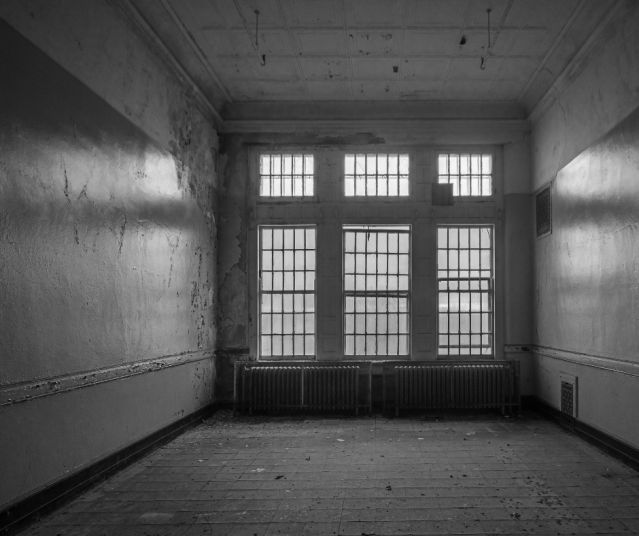Psychiatry
Bringing Back Institutionalization Would Be Inhumane—and Ineffective
After decades of consensus, there’s a debate raging over institutionalization.
Posted November 21, 2023 Reviewed by Devon Frye

In a recent message to supporters, former President Donald Trump declared that, if he were again elected to the White House, he would “use every tool, lever, and authority to get the homeless off our streets.” The candidate went on: "And for those who are severely mentally ill and deeply disturbed, we will bring them back to mental institutions, where they belong… with the goal of reintegrating them back into society once they are well enough to manage."
Trump’s statement was notable for a key reason: It broke sharply with 60 years of official policy consensus.
Mental health is likely to be among the key issues in America's 2024 presidential election. But the coming year’s debates won’t just focus on typical questions like public funding for clinics or rules around insurance coverage. The campaign is likely to reopen difficult debates about institutionalization that had been largely settled for a generation.
In 1963, President John F. Kennedy signed the Community Mental Health Act, as a response to growing public awareness about horrendous conditions at inpatient mental health facilities around the United States. The law funded the initial creation of locally based mental healthcare systems, driving a wave of deinstitutionalization. In the decades that followed, public pressure mounted against warehousing people in psychiatric facilities, the U.S. Supreme Court placed limits on involuntary institutionalization, and, eventually, President Ronald Reagan cut federal funding for most of the remaining psychiatric hospitals.
All the progress toward deinstitutionalization was progress for human rights and dignity. Yet the work was left incomplete.
When the Reagan Administration cut funding for public psychiatric hospitals, it largely failed to increase funding for the community-based facilities that were intended to replace them. As a result, scores of people with serious mental health conditions were left with no place to go—and, in many cases, they wound up in prisons or on the streets. Today, the National Alliance on Mental Illness estimates that more than 20 percent of unhoused people have a serious mental health condition.
This is likely why—amidst a growing crisis of homelessness—Trump’s comments are resonating with some voters. And, among politicians, he’s not alone. New York City’s Democratic Mayor, Eric Adams, has recently made the case for involuntary institutionalization as a strategy for people with severe mental illness who are living on the streets.
As Trump and others propose a return to large-scale institutionalization, it’s important to remember that the decades-long consensus against institutionalization emerged for good reason. Warehousing people in psychiatric facilities is not just inhumane but also ineffective.
Let's start with the moral case. In the mid-20th century, appalling stories of abuse and neglect at psychiatric institutions surfaced around the world. Yet even the best-managed, best-funded facilities still represent abuses of human rights.
Placing a person in an institution means removing that person from their community and family and restricting their agency and autonomy to make the most basic decisions about their lives and their care. Institutionalization reinforces stigmatization and dehumanization—the sense that a person is inherently "less than" and that they represent a diagnosis rather than a human life.
The moral case against institutionalization also helps explain the practical case against it.
Studies have documented that the social disconnection of institutionalization tends to exacerbate patients' symptoms and contribute to further psychological deterioration. Large institutions have historically been ineffective in providing customized, recovery-oriented mental health care—which is essential for addressing complex mental health cases that can hinge on not just psychological conditions but also on broader issues like substance abuse or financial precarity.
While former President Trump and others often emphasize that the goal of institutionalization is to eventually reintegrate people into society, large psychiatric facilities can often create institutional dependencies, undermining people’s capacity to survive and thrive in the outside world. If the goal is healing and reintegration, then it’s important to fund comprehensive and community-based care as well as necessities like affordable housing and substance abuse treatment programs.
It may be particularly poignant that Donald Trump is promising to place people with severe mental illness in institutions, in his words, “where they belong.” That’s because this word, belonging, is the crux of the issue—just not in the way that Trump employs the word.
In researching my recent book, I interviewed over 150 experts from diverse disciplines—including psychology, neuroscience, and social theory—on the topic of how to build belonging in our society. I arrived at the conviction that belonging is a fundamental precondition for addressing the mental health challenges that our society is facing. Over the course of my research, I realized that building belonging means cultivating connection to community as well as place, power, and purpose. This is to say: once most fundamental biological bases of psychological health are achieved, our ability to find well-being depends on our connection to other people as well as our ability to feel grounded in a sense of home and our ability to feel voice, agency, and meaning in our lives.
Belonging isn’t just a human drive and human need. It’s our human birthright.
The fact is that no one belongs in an institution. To warehouse a person in a facility without connection to the outside world is to make a person “less than,” denying their essential humanity and closing the essential pathways to healing. Institutionalization is one of the most pernicious forms of "othering" that has emerged in human history.
Today’s mental health crises are urgent. Yet there are viable alternatives to bringing back large-scale institutionalization.
For example, assertive community treatment (ACT)—an intensive, team-based approach to care for people with serious mental illnesses who might otherwise cycle through hospitals and prisons—provides around-the-clock support to individuals in their own homes and communities. Crisis intervention teams (CIT) are programs that involve training first responders to more effectively address mental health crises. The aim is to de-escalate potentially volatile episodes and divert individuals from the criminal justice system to mental health treatment. Peer support services, which are led by individuals who have experienced mental illness themselves, can provide empathy and practical assistance to people who might not otherwise be receptive to care.
If we want to find enduring, long-term solutions to modern mental health crises, we need to pair therapeutic and pharmacological treatments with broader strategies to bolster belonging. This means investing in social connectedness along with strategies to give people a sense of voice, choice, and meaning in their lives. I’ve outlined many such solutions in this Psychology Today series as well as my book, On Belonging: Finding Connection in an Age of Isolation.
I think, for example, of the Friendship Bench—an initiative that transformed mental healthcare in Zimbabwe by training grandmothers in evidence-based talk therapy—which they then deliver to people on park benches. The project shows how to ease isolation and distress through reciprocity: As the grandmothers serve others, they feel heard and seen, which helps create positive feedback loops of support and belonging.
Amidst the current challenges, there may be reforms to mental healthcare—including easing some of the caps on the size of inpatient mental health facilities that are eligible for federal funding to accommodate current needs. Yet we need to recognize that there’s ultimately a difference between building capacity for inpatient care for people in extreme circumstances and committing people against their will to live apart from loved ones and detached from society as a whole.
We should indeed use “every tool and lever” to address the crises of homelessness and mental health, as Donald Trump suggests. Yet this should mean the opposite of institutionalization.
This means applying creativity and compassion—along with serious resources—to the complex challenges we’re facing today.
No one "belongs" in an institution. We only belong when we belong together.




